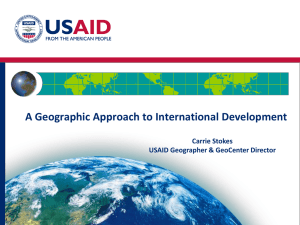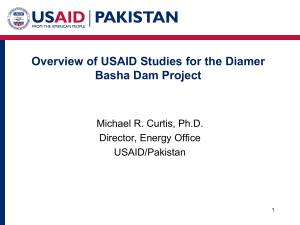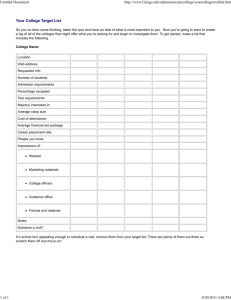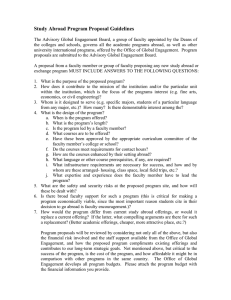International Grant Funding Opportunities October 2012 Department of Education
advertisement
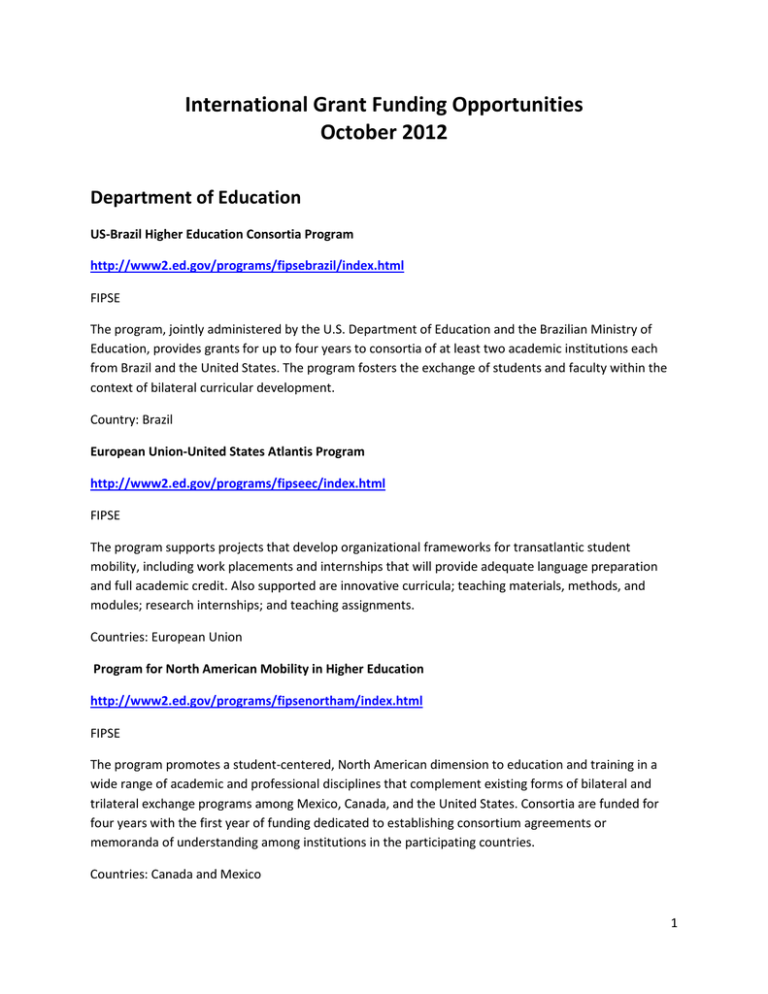
International Grant Funding Opportunities October 2012 Department of Education US-Brazil Higher Education Consortia Program http://www2.ed.gov/programs/fipsebrazil/index.html FIPSE The program, jointly administered by the U.S. Department of Education and the Brazilian Ministry of Education, provides grants for up to four years to consortia of at least two academic institutions each from Brazil and the United States. The program fosters the exchange of students and faculty within the context of bilateral curricular development. Country: Brazil European Union-United States Atlantis Program http://www2.ed.gov/programs/fipseec/index.html FIPSE The program supports projects that develop organizational frameworks for transatlantic student mobility, including work placements and internships that will provide adequate language preparation and full academic credit. Also supported are innovative curricula; teaching materials, methods, and modules; research internships; and teaching assignments. Countries: European Union Program for North American Mobility in Higher Education http://www2.ed.gov/programs/fipsenortham/index.html FIPSE The program promotes a student-centered, North American dimension to education and training in a wide range of academic and professional disciplines that complement existing forms of bilateral and trilateral exchange programs among Mexico, Canada, and the United States. Consortia are funded for four years with the first year of funding dedicated to establishing consortium agreements or memoranda of understanding among institutions in the participating countries. Countries: Canada and Mexico 1 United States-Russia Program: Improving Research and Educational Activities in Higher Education http://www2.ed.gov/programs/fipserussia/index.html FIPSE Provides grants that demonstrate partnerships between Russian and American institutions of higher education that contribute to the development and promotion of educational opportunities between the two nations, particularly in the areas of mutual foreign language learning and the cooperative study in all subject areas. Country: Russia Business and International Education Program http://www2.ed.gov/programs/iegpsbie/index.html Department of Education This program provides funds to institutions of higher education (IHEs) that enter into agreements with trade associations and businesses to improve the academic teaching of the business curriculum and to conduct outreach activities that expand the capacity of the business community to engage in international economic activities. Countries: Various Fulbright-Hays--Group Projects Abroad Program http://www2.ed.gov/programs/iegpsgpa/index.html Department of Education This program provides grants to support overseas projects in training, research, and curriculum development in modern foreign languages and area studies for teachers, students, and faculty engaged in a common endeavor. Projects may include short-term seminars, curriculum development, group research or study, or advanced intensive language programs. Countries: Various Fulbright-Hays—Faculty Research Abroad http://www2.ed.gov/programs/iegpsfra/index.html Department of Education This program funds fellowships through institutions of higher education (IHEs) to faculty members who propose to conduct research abroad in modern foreign languages and area studies to improve their skill in languages and their knowledge of the culture of the people of these countries. Funds support: travel 2 expenses to and from the residence of the fellow and the country or countries of research, a maintenance stipend for the fellow related to his or her academic year salary, and an allowance for research-related expenses overseas such as books and photocopying, tuition, affiliation fees, local travel, and other incidental expenses. Countries: Various Fulbright-Hays—Seminar Abroad – Bilateral Projects http://www2.ed.gov/programs/iegpssap/index.html Department of Education The program provides short-term study and travel seminars abroad for U.S. educators in the social sciences and humanities for the purpose of improving their understanding and knowledge of the peoples and cultures of other countries. Support is generally made available through interagency agreements. The Department of Education transfers funds through the State Department to Fulbright commissions in various countries to pay the costs associated with administering seminars. This partnership allows the program to use the services and expertise of binational organizations to plan and conduct seminars for U.S. educators. Countries: Various United States Agency for International Development Development Innovation Ventures (DIV) http://idea.usaid.gov/div/how-apply United States Agency for International Development DIV seeks projects with innovative ideas that address development challenges more efficiently and costeffectively than standard practice and that could ultimately scale to reach millions of beneficiaries. Approximately $20 million is available for Stage 1 awards of up to $100,000; Stage 2 awards of up to $1 million; and large-scale awards of up to $15 million. Colleges and universities are eligible to apply directly Countries: Various Higher Educations Solutions Network http://universityengagement.usaid.gov/ United States Agency for International Development Seeks to establish centers that engage faculty, students, and community partners in creative, sciencebased approaches to meet USAID's core development objectives. Centers will define and solve 3 challenging development problems; sustain creative, evidence-based, multidisciplinary approaches to international development; and expand the role of STEM to solve complex development problems. Up to $100 million is available for multiple awards. Countries: Various Unsolicited Concept Papers and Proposals http://transition.usaid.gov/university United States Agency for International Development Considers five-page concept papers and 15-page proposals addressing ways to advance U.S. foreign assistance objectives (see instructions). Applicants must demonstrate clear understanding of USAID's sector and country strategies and should propose specific institutional linkages that are not supported by other USAID programs. Projects that are based only in the U.S. or that propose U.S. infrastructure development are not eligible. Matching requirement is 25 percent. Proposals are reviewed quarterly Countries: Various Ameircan Schools and Hospitals Abroad http://www.usaid.gov/our_work/cross-cutting_programs/asha/grant.html United States Agency for International Development The principle objective of the grants is to serve ASHA's goal of demonstrating U.S. advances in education and medical technology and practices, in areas of research and training in selected countries. Grants made under this program help such institutions demonstrate to people overseas the achievements of the United States in education and medicine. Provide the benefits of a U.S. style education to developing countries, moreover, to increase the understanding between the people of the United States and other countries. Regions: Africa, Asia, Eurasia, Europe, Latin America, the Caribbean and the Near East Partnerships for Enhanced Engagement in Research (PEER) http://sites.nationalacademies.org/pga/dsc/peer/index.htm USAID and NSF Supports projects such as: • • Food security topics such as agricultural development, fisheries, and plant genomics Global health issues such as ecology of infectious disease, biomedical engineering, and natural/human system interactions 4 Climate change impacts such as water sustainability, hydrology, ocean acidification, climate process and modeling, and environmental engineering • Other development topics including disaster mitigation, biodiversity, water, and renewable energy Countries: Indonesia, Lebanon Philippines • Department of State International Sports Program Initiative http://exchanges.state.gov/grants/open2.html U.S Department of State Supports partnerships among U.S. IHEs and foreign institutions to enhance and improve the infrastructure of youth sports programs in select countries around the world. The focus of all programs must be reaching out to youth ages 7-17 and/or their coaches and administrators. Themes include: Youth Sports Engagement, Sport and Disability, Sport for Social Change, and Sport and Health. Programs designed to train elite athletes will not be considered. Limited submission: one application per institution. FY13 competition's announcement expected in November. International Programs to Combat Trafficking in Persons http://www.state.gov/j/tip/intprog/index.htm U.S Department of State Program's mission is to combat modern slavery by employing a "3 P" strategy: preventing trafficking in persons, protecting/assisting trafficking victims, and prosecuting traffickers and others who profit from trafficking in persons. Program supports leadership and coordination within the U.S. government and engages with foreign governments, civil society and multilateral organizations to devote resources to addressing human trafficking. Program encourages partnerships with international agencies. FY 13 competition expected. Middle East Partnership Initiative http://www.mepi.state.gov/ U.S Department of State MEPI assists efforts to expand political participation, strengthen civil society and the rule of law, empower women and youth, create educational opportunities, and foster economic reform throughout 5 the Middle East and North Africa (MENA). Opportunities include: Support for Private Sector Development in the MENA Region (4/17); BMENA Forum for the Future Civil Society Reform Initiatives (3/23); Tunisia: Supporting a Democratic Transition. William C. Foster Fellows Visiting Scholars Program http://www.state.gov/t/avc/c40184.htm U.S Department of State Supports tenured or tenure track faculty (U.S. Citizens only) in fields such as history, regional studies, nuclear engineering, nuclear physics, nuclear forensics, mathematics, political science, and foreign policy. Applicants selected annually for one-year assignments in State Department's participating bureaus: Arms Control, Verification and Compliance; International Security and Nonproliferation; and Political-Military Affairs. National Science Foundation Partnership for International Research and Education (PIRE) http://www.nsf.gov/funding/pgm_summ.jsp?pims_id=12819 National Science Foundation The Science, Engineering, and Education for Sustainability (SEES) effort focuses on interdisciplinary topics that will advance sustainability science, engineering and education as an integrative approach. Deadline (pending) refers to required preliminary proposals. International Research Experiences for Students (IRES) http://www.nsf.gov/funding/pgm_summ.jsp?pims_id=12831 National Science Foundation Supports development of globally-engaged U.S. science and engineering students capable of performing in an international research environment at the forefront of science and engineering. Supports active research participation by students enrolled as undergraduates or graduate students in any of the areas of research funded by NSF. Program also includes Doctoral Dissertation Enhancement Projects which support dissertation research abroad by a single doctoral student in collaboration with a foreign investigator (proposals accepted any time). 6 Catalyzing New International Collaborations http://www.nsf.gov/funding/pgm_summ.jsp?pims_id=12815 National Science Foundation Supports initial phases of an international collaboration with the strong expectation that the next phase will involve submission of a follow-on proposal for continued funding of the collaborative research. Demand for funding of the follow-on international activities may generate new models and enhanced capabilities for supporting such projects. Proposals should describe U.S. participation in new international collaborations and PIs must establish communication with the cognizant OISE country PO prior to submission. Proposals accepted anytime. Other Sources US Institute of Peace http://www.usip.org/grants-fellowships US Institute of Peace supports innovative peace building projects involving research, the identification of promising models and effective practices. Moreover, they focus on preventing, managing, and resolving violent conflict and promoting post-conflict in settings outside the U.S. Japan US Friendship Commission http://www.jusfc.gov/ Japan US Friendship Commission seeks applications that engage in exchanges, global challenges, arts, culture, education and public affairs between the Japan and the US. NIH- Fogarty International Center http://www.fic.nih.gov/Funding/Pages/default.aspx Fogarty International Center at NIH offers a variety of funding opportunities to support the field of global health research. Fogarty also offers a variety of resources for those seeking global health research funding across NIH, and from other organizations. 7


